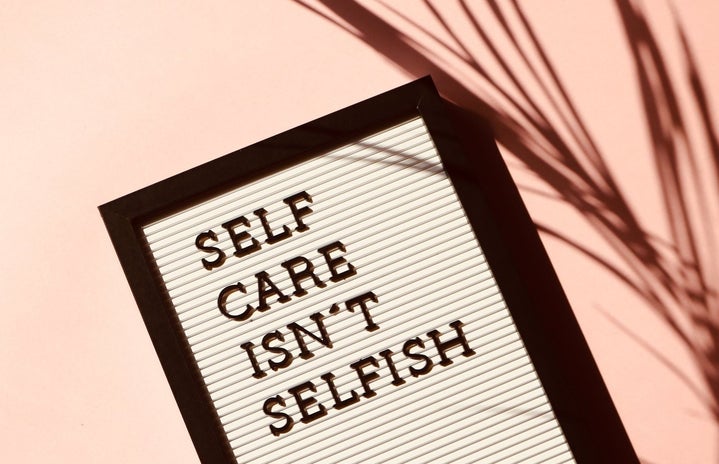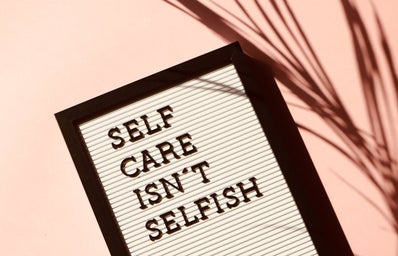Mental health has always been an important topic for me to advocate for, especially during the pandemic, when it was tough on everyone to maintain a proper balance of emotional, psychological, and social well-being. Mental health is still stigmatized to this day, so it is easy to fall out of place with your inner peace and individuality during times of stress and discomfort. Personally, I have always had a love/hate relationship with anxiety, but it was brought to another level when the pandemic struck as social isolation and a lack of motivation were huge factors to my downfall. However, through the ups and downs of this pandemic, I was able to bounce back and become a better and more productive version of myself that I believe is stronger than who I used to be. I wanted to create this guide to help direct people on the right path, but also for people to adapt where needed because this isn’t fit for everyone. Following these steps religiously is not the goal of this guide, but a place for you to start if you know that you are struggling to maintain a positive mindset. This is something that I want people to be able to relate to and understand that you are not alone when it comes to maintaining a healthy well-being. Here’s how I was able to maintain my mental health when times get tough:
Understand that putting yourself first isn’t selfish
What a lot of people struggle with, including myself, is finding when and when not to put yourself first. However, there shouldn’t be this limit of when or when not to put yourself first as this is one thing that can lead to emotional and physical burnout. Throughout my university career, this one quote always sits in the back of my mind and truly helps me get out of my head for feeling guilty for taking time for myself:
“If you feel guilty when relaxing or taking a break, you aren’t truly relaxing or taking a break.”
We are only human, and it is essential that we treat ourselves the way we treat other people. This keeps a healthy mindset because you only give about as much energy to people as you give to yourself. Self-care brings out the best in everyone, which is entirely noticeable in others around you. This is one thing that helped me maintain good mental health because I found joy in being nice to myself which kept me positive through times that weren’t.
Find ways to express yourself
Whether it’s journaling, listening to your favourite music genre, or practicing your yoga skills, taking time out of your day to express how you feel, is one way that leads to good mental stability. Expressing your thoughts, ideas, and emotions is a core aspect to maintaining your mental health, and these activities may be the answer to get you through some of the most stressful and toughest of times. I find that doing something that expresses my thoughts gives me a creative power boost that enhances my motivation for school and work life. Some other ways to express yourself include, reading a book that makes you feel all the feelings, diving into your spiritual side, calling a close friend and having a rant session or utilizing your time alone such as making dinner or relaxing with a glass of wine.
Breathe
I know this may sound cliché, but breathing has so many benefits including calming and destressing your mind. To get me through my tough times, breathing was one thing that I could control when everything else was out of my hands. My tip is to breathe in through the nose, hold for 10 seconds or as long as you can, and breathe out slowly for ten seconds. Most people say to breathe out through your mouth during this exercise, but honestly for me, breathing out through my nose does the trick too. To keep a grounded and stable mindset, breathing exercises truly help keep everything in perspective and are a healthy activity to cleanse the mind.
Set realistic goals
One way I was able to bounce back and become this ideal version of myself, was by setting realistic goals that I knew I could achieve. It does not matter if the goal is small or large, it just has to be realistic and manageable in a time frame that you know could get done within a couple of weeks or months. Setting goals for yourself ultimately helps you stay mentally motivated. One goal that I set for myself was to journal at least two times a week, and the more I stuck with this goal, the more I found myself looking forward to journaling and keeping this goal maintained throughout my journey. One thing I would like to add though, is that it is okay if you miss or don’t achieve your goal right away. I definitely missed a couple of days of journaling, but it didn’t set me back, it only reminded me to give a little more time throughout my day to achieve this goal. No goal created is going to go perfectly by doing it the first time!
Make mistakes
This leads me to my last and final tip of the day; do not be afraid to make mistakes as this is what creates a good and balanced mental well-being. During my times of stress, I knew that making mistakes only made me feel worse. I felt disheartened as I knew I wasn’t setting enough time for myself, expressing my thoughts, breathing, or setting realistic goals. If we turn this around and look at it in a different light, sometimes we need these so-called ‘mistakes’ to realize what is truly important to us. It is okay to be upset or sad for a while as we can only handle and do so much until our body physically and mentally cannot bear it. These mistakes are what make our mental health good because we know we can come back from them, and we understand that they are what makes us capable of improving ourselves. Mistakes are something we learn from, not fall from, and they let us know we are human.
Overall, these tips are just guidelines that shouldn’t be followed intensely but adjusted to fit your way of life and be used as some helpful reminders. This is what helps me get through my poor mental health days and allows me to become better than the day before. Hopefully, this helps give some insight if you are struggling and feel free to reach out if you need more information on mental health resources or just need someone to talk to.
Resources:


